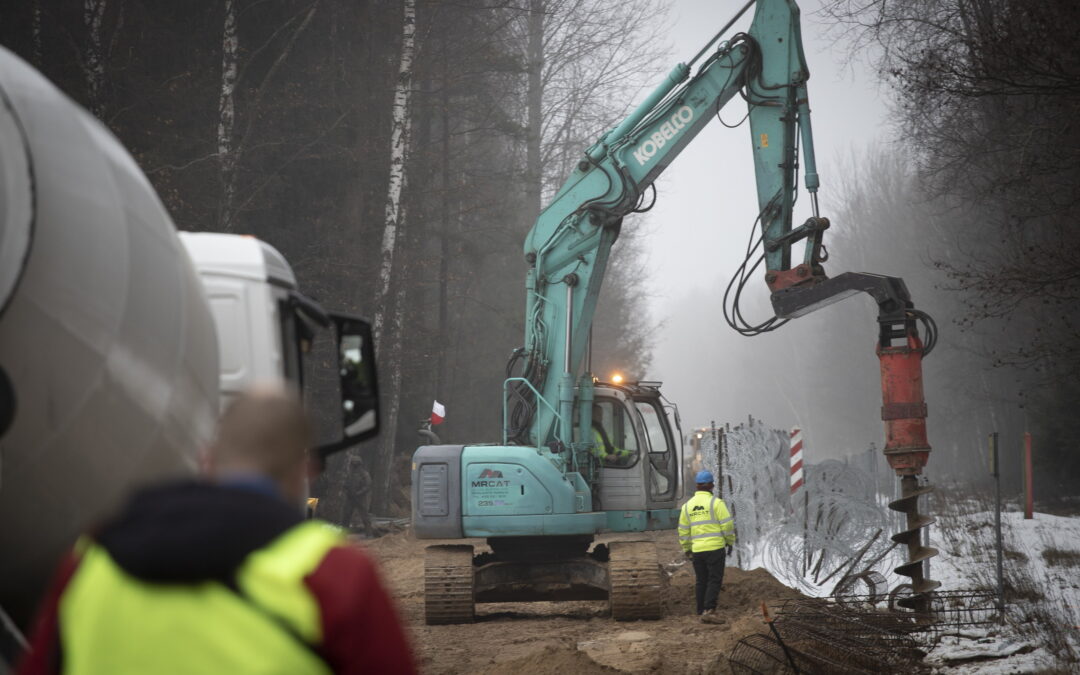More than 700 scientists have issued a joint appeal against Poland’s decision to build a wall on its border with Belarus, which they say will have a “devastating” impact on the area’s valuable and delicate ecosystem.
In their letter to European Union leaders, the academics – who are from both Poland and abroad – call for a full assessment of the impact of the wall – work on which began earlier this month – before construction proceeds any further.
27 stycznia br. odbyła się wizyta przedstawicieli mediów na budowie bariery na granicy 🇵🇱🇧🇾#ochronagranicy #bariera pic.twitter.com/yrxdwhpVt5
— Straż Graniczna (@Straz_Graniczna) January 28, 2022
The 186-kilometre-long barrier – which will be 5.5 metres high and topped with razor wire – is being built in response to a surge in border crossings since last summer. Thosuands of people, mainly from the Middle East, have been seeking to enter the European Union with help from the Belarusian authorities.
Plans to build the €350 million “impenetrable” wall were proposed by the government in October and approved by the president the following month. Construction is due to be completed by the end of the summer this year.
Concerns have been raised, however, about the fact that the wall will run through one of Poland’s – and Europe’s – most important natural areas. Part of it will be located in Białowieża Forest, a UNESCO World Heritage Site that is Europe’s last remaining lowland primaeval woodland.
Other parts will run through six areas protected under the EU’s Natura 2000 programme. Even outside these areas, the border region is home to – and a migration route for – many rare and protected species of animals. Environmentalists are thus worried that the wall could interfere with important habitats.
In the new letter, published on the Nauka dla Przyrody (Science For Nature) community website, the 713 scientists wrote that the wall will create a “barrier with devastating consequences” and that logging and road development during its construction will be “detrimental to the conservation status of species and habitats”.
The signatories argue that interruptions to ecological corridors between Europe and Eurasia will block migration routes of large mammals such as the European bison, wolf, lynx, elk and deer.
The government has assured that there will be “passages for animals in places of naturally occuring migration corridors”. But the scientists argue that these may “not be effective”.
The makeshift razor-wire fence erected by Poland on the border last year has already been decried by conservation groups, with some blaming it for the recent death of a bison in the area. However, the environment ministry and border guard deny that, saying that the animal was ill and died from natural causes.
In response to concerns about the removal of trees, border guard spokeswoman Anna Michalska told Gazeta Wyborcza that most of the border area is already woodless and “trees will be cut only where it is absolutely necessary”.
“The border guard makes every effort to ensure that there is as little interference in the environment as possible during the construction of the barrier,” she assured. “Serving in nature reserves or national parks is one of the most important assets of our service and we care for this natural environment.”
In their letter, the scientists also note that, as a result of emergency regulations passed in November, the border wall project has been exempted from a number of regulations, including construction law, water law, environmental law and requirements on sharing information about the protection of agricultural, forest and environmental land.
“No assessment of the impact of the project on the conservation objectives of the Natura 2000 Białowieża Forest area was carried out, which constitutes a clear infringement of Article 6(3) of the Habitats Directive,” says the letter.
The scientists thus appeal to the European Commission to “take all the possible measures to immediately halt the construction” until an assessment of the impact is carried out in accordance with EU laws.
Poland has already in recent years been in conflict with Brussels over Białowieża Forest, after the environment minister in 2016 approved a large increase in logging there. The European Court of Justice ultimately found that decision to have been in violation of EU environmental laws.
Main image credit: Grzegorz Dabrowski / Agencja Wyborcza.pl

Maria Wilczek is deputy editor of Notes from Poland. She is a regular writer for The Times, The Economist and Al Jazeera English, and has also featured in Foreign Policy, Politico Europe, The Spectator and Gazeta Wyborcza.




















